The past couple of decades have seen the appearance of so many gigantic CG waves in big-budget movies that they almost qualify as stock henchmen, popping up as bonus disaster-porn footage in movies that don’t actually take place in the ocean or even on a shoreline. The Finest Hours, though, does take place almost entirely in the ocean and on a shoreline. Telling the true story of a 1952 Coast Guard rescue, it justifies its wave after wave of well-rendered CG water, bearing down relentlessly on the film’s heroes.
Both groups are filled out with a fine selection of character actors; Ben Foster, John Ortiz, Abraham Benrubi, Kyle Gallner, and Michael Raymond-James, among others, all share the role of That Guy. That Guy doesn’t have a lot to do, but not because the movie insists on tasking Pine and Affleck with big-ticket heroics. Both characters are quiet and unassuming for a rescue-mission picture, especially Pine’s Bernie, whose status as an earnest rule-follower becomes clear long before the movie points it out directly.
In the gentle opening scenes, Bernie meets and courts Miriam (Holliday Grainger), a girl he’s only talked to on the phone. When she proposes to him (a charming detail, especially for a period piece), Bernie presumes he must get sign-off from his superior officer, even though he’s repeatedly told that the practice isn’t real protocol, “just a formality.” That officer (Eric Bana) then sends him out on what several local fishermen consider a suicide mission to save the tanker crew. Bernie accepts because he cannot question a commanding officer’s orders, and the rest of his mission has Bernie learning to bend or break the official rules based on his own judgment of the greater good. Essentially, Pine is playing the opposite of his James T. Kirk, who spent two Star Trek movies learning (repeatedly) to temper his rule-flouting heroics with a level head and respect for the chain of command.
But metatextual twists on a familiar persona aren’t really enough to keep The Finest Hours moving at its initial clip. For a while, the sheer scope and relentlessness of the ocean storm carries it along, especially in the scenes on Ray’s tanker, where the camera drifts through the bowels of the ship to capture all of the men at work. In one sequence, the (presumably digitally aided) camera follows a chain of orders as they’re hollered and passed along throughout the boat. The 3-D version of the movie is mostly unnecessary, as are most, but director Craig Gillespie does show a talent for using 3-D to enhance interior spaces, as he did in his otherwise undistinguished remake of Fright Night.
Gillespie is building a studio journeyman career, having bounced from comedies broad (Mr. Woodcock) and indie (Lars And The Real Girl) to horror (Fright Night) to the Disney uplift of Million Dollar Arm and, to some extent, this movie. (The Disney pedigree explains why no one in it swears like a sailor). The Finest Hours has a professional, straightforward polish, and much of it is absorbing in the moment, with each creak of the ship and crash of the waves providing the requisite flinches—at least for the first hour or so. As it continues, the movie never adds up to more than the sum of its flinches. The ocean-set peril grows monotonous, and the attempts to infuse Grainger’s worry-girl role with some agency and dramatic urgency are noble, but largely unsuccessful.
As charming as the early scenes are, The Finest Hours doesn’t really come together as a love story, either, and Affleck’s scenes on the tanker are too abbreviated to really sink in as great survival drama. Gillespie’s movie is better than a CG wave demo reel, with some passages of old-fashioned entertainment. But not much lurks under the roiling surface. Just, as Bernie quietly jokes, more water.

